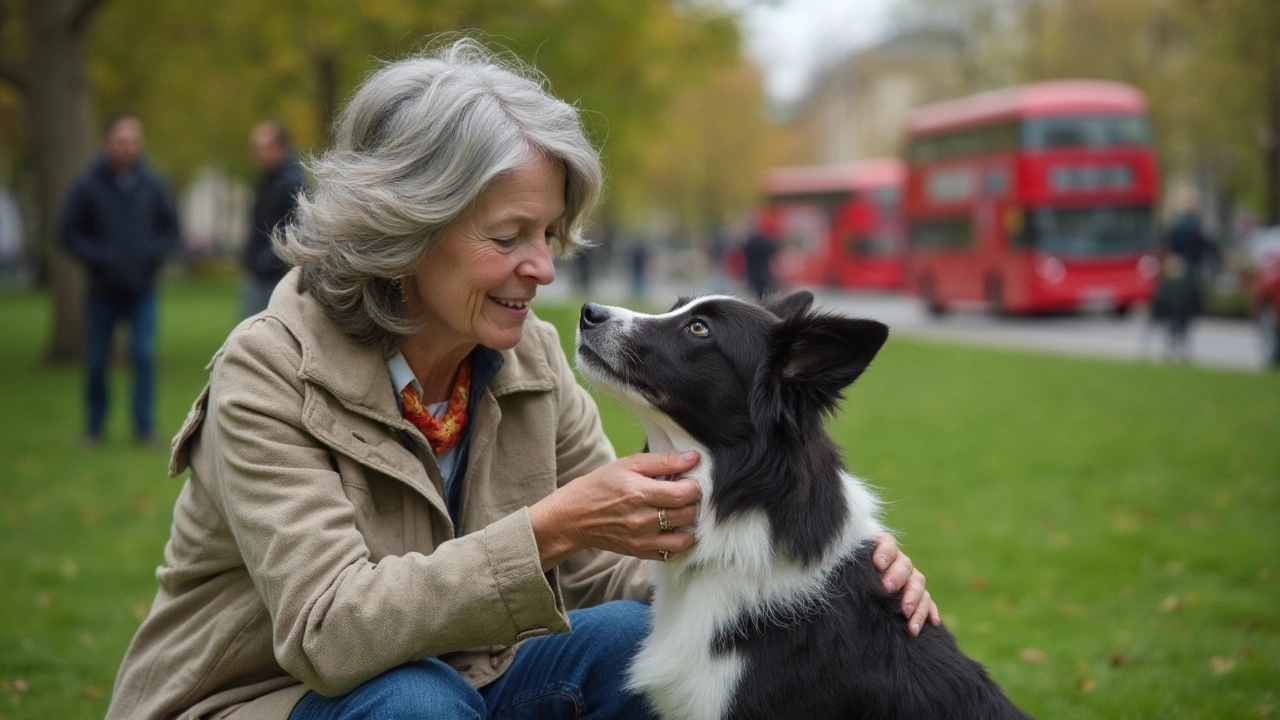Ever wonder why your dog licks you like it’s their full-time job? It’s not just about love—though that’s a big part of it. Licking is how dogs explore their world, much like babies putting stuff in their mouths. Your skin tastes salty to them, and that’s actually a treat, especially if you’ve just finished a workout or cooked dinner.
Licking can mean tons of things: they’re saying hi, asking for attention, or letting you know it’s time for a snack. Some pups lick as a way to calm themselves or show submission. If your dog licks your face after you’ve been gone for a while, it’s like their version of a hug. But sometimes, licking has more to do with what’s going on inside your dog than the world outside. If the habit starts ramping up or seems obsessive, it might be your dog’s way of telling you something in their body doesn’t feel right.
- What Your Dog’s Licking Really Means
- When Licking Is a Health Signal
- Simple Ways to Manage Excessive Licking
- Linking Diet, Supplements, and Licking Behavior
What Your Dog’s Licking Really Means
If you’re curious about why your dog showers you with slobbery licks, it turns out there’s a lot more to it than just puppy love. Most pet experts agree that dog licking is loaded with different meanings. The most obvious one is affection. Your dog’s licks are their way of saying, “I like hanging out with you.” This goes back to puppyhood, when mother dogs lick their babies to groom them and show care.
There’s also a social side. Dogs lick each other’s faces to say hello or show they’re not a threat. If your dog greets you with a tongue to the cheek, that’s just part of their “pack” behavior. Sometimes, they’re just trying to grab your attention—maybe you’re late for a walk or they want to play fetch. Body language can help you guess the reason: a relaxed tail usually means it’s friendly, while nervous licking could signal stress or submission.
Licking can also be about curiosity. Dog licking is a bit like reading a magazine for them—it’s how they gather info about their world, including what you’ve been touching or eating. Your skin, sweat, and even lotions hold all sorts of smells and flavors a dog finds interesting—way more than we notice.
Interestingly, scientists have found that licking triggers the release of endorphins in a dog’s brain. Endorphins are feel-good chemicals that help dogs calm down, especially if they’re feeling anxious. So, constant dog licking might be your pup’s way of dealing with stress, boredom, or even loneliness. When licking starts to take over your dog’s life or keeps getting more frequent, it could be time to look at reasons beyond just affection or taste.
- Dog behavior: Licking as a greeting or a way to ask for something.
- Exploring flavors: Dogs love your salty skin or that weird taste left by hand lotion.
- Stress relief: Licking helps dogs self-soothe, just like how people bite nails.
- Communication: A lick can mean, “Let’s play,” “I’m hungry,” or even, “I’m nervous.”
If it feels like your dog is obsessed with licking, it’s probably not a quirk—they’re trying to tell you something. Pay attention to what’s going on when the licking happens. Are you just back from work? Did you switch your soap? Are they bored or left alone a lot? Sometimes, little changes make a big difference in how much licking you’ll get.
When Licking Is a Health Signal
Sometimes, your dog’s licking habit can go from cute to concerning. If your pup is suddenly obsessed with licking you, themselves, or random surfaces, it’s not always about showing you affection. Dog licking can be a sign of an underlying health issue or discomfort.
Here’s what to watch for: if licking is constant, paired with whining, scratching, hair loss, or red skin, your dog could be dealing with allergies, skin infections, or even anxiety. Vets often see dogs licking their paws or hot spots when something’s bugging them—literally, like fleas, or something more complicated like food irritation. And don’t ignore licking at the air or walls. This can sometimes mean nausea or something off in their belly.
Check out this quick comparison of harmless licking versus signs that it might be a problem:
| Type of Licking | What to Expect | Possible Health Triggers |
|---|---|---|
| Affectionate Licking | Short, when greeting or cuddling | Normal behavior |
| Obsessive Licking | Constant, focused in one spot, interrupts daily life | Allergies, pain, anxiety, GI trouble |
| Licking Surfaces | Unusual, repeated licking at walls, floors | Nausea, dental issues, neurological problems |
Look, no one’s saying you need to panic if your dog likes to give you kisses, but pay attention. If the licking seems to come out of nowhere or you see raw or balding patches, don’t wait it out. A visit to the vet can help pin down allergies, check for pain, or rule out digestive trouble. Early action matters: dogs can get stuck in the habit, especially if it started because of untreated irritation.
Sometimes fixing this is as simple as changing their food, adding a dog health supplement for skin or digestion, or dealing with a flea problem. Keep those regular vet checks on your calendar—dogs aren’t great at telling us what hurts, but their licking might be their biggest clue.

Simple Ways to Manage Excessive Licking
If your dog’s licking starts to hit ‘marathon’ levels, it’s a good idea to address it. Too much dog licking can annoy you, cause skin irritation, or even signal something’s up with your pet’s health.
Start by ruling out medical causes. Health issues like allergies, digestive problems, or pain can make dogs lick more. If licking becomes nonstop or they’re targeting one spot, check in with your vet. About one in four pups that lick excessively actually have an underlying health issue that needs attention.
- Redirect their focus. When your dog starts licking, gently move their attention to a toy or treat. Chew toys, puzzle feeders, and interactive play work wonders.
- Ignore the behavior. If you react every time they lick, you could be feeding into the habit. Stay calm and act like a statue. Dogs notice when licking doesn’t get a reaction and might ease off.
- Reward calm moments. When your dog is chilling and not licking, hand out treats or positive attention. This helps them connect relaxation with good things.
- Keep routines predictable. Dogs tend to lick out of boredom or stress. A regular schedule for walks, play, and meals keeps them busy and less likely to lick out of habit.
If you notice your dog licks after eating or during thunderstorms, it could be anxiety or tummy trouble. Supplements designed for stress or dog health can sometimes chip away at this habit, but talk to your vet first.
| Common Triggers | Simple Fixes |
|---|---|
| Boredom | Daily exercise, new toys |
| Skin irritation | Vet check, switch shampoo or diet |
| Separation anxiety | Distraction toys, calming supplements |
Stick with these tips and be patient. The licking habit usually fades when your dog feels more settled, busy, and healthy. If things don’t improve, even after you try everything in your toolbox, lean on your vet for help and dig into possible medical or behavioral fixes.
Linking Diet, Supplements, and Licking Behavior
If your dog is constantly licking you or other things around the house, it's worth taking a closer look at what’s going in their bowl. Dogs need a balanced diet, and missing out on certain nutrients can sometimes lead to obsessive licking. For example, if a dog isn’t getting enough vitamins or minerals, they might start licking to soothe themselves or to taste different things, even your skin.
Dry skin is a big issue that often gets overlooked. Dogs with dry skin tend to lick more, trying to relieve itchiness or discomfort. This can be triggered by not getting enough healthy fats like Omega-3s in their diet. A lot of pet owners start giving dog health supplements like fish oil, which can help with itchy skin and make that over-the-top licking settle down.
Sometimes dogs lick because their tummy feels off. A poor-quality diet or an allergy to something in their food can cause upset stomachs, and dogs will often lick their lips, paws, or even you when they feel uncomfortable. Switching to higher-quality food or adding a probiotic supplement may cut back on this weird habit.
| Possible Diet Issue | Licking Behavior | Helpful Supplement |
|---|---|---|
| Lack of Omega-3s | Licking paws/skin | Fish oil or salmon oil |
| Stomach Upset | Licking lips/objects | Probiotics, digestive enzymes |
| Low-quality food | General excessive licking | Switch to premium food, multivitamins |
Before adding anything new, talk to your vet. Too many supplements, or the wrong ones, can create more problems than they solve. I remember when Ethan and I gave our old Labrador a random supplement we saw online, and it made her sick for days. Lesson learned—stick to stuff that's actually recommended for dogs, and always ask a professional first.
If licking seems to get better when you tweak your dog’s diet or add a supplement, that’s usually a good sign you’re on the right track. But if it doesn’t, or if the licking really ramps up, it’s time for a check-in at the vet just to rule out hidden problems.

